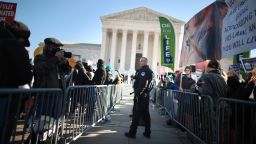Editor’s Note: Mary Ziegler is a law professor at Florida State University College of Law and author of “Abortion and the Law in America: Roe v. Wade to the Present.” Follow her @maryrziegler. The opinions expressed here are those of the author. View more opinion on CNN.
For months, abortion bans made national headlines, in large part thanks to Texas. The state passed a law banning abortion at six weeks, the point at which doctors could detect fetal cardiac activity, and allowed any private citizen to sue a doctor or person aiding or abetting someone seeking an abortion for at least $10,000 dollars a procedure. The legislation solved the state’s problems of enforcing laws by creating a lucrative bounty and incentivizing neighbors, friends and family to report one another.

After the US Supreme Court’s inaction, the law went into effect in September, and many providers stopped offering abortions after six weeks – before many know they are pregnant, much less able to make a weighty decision about abortion. Many women were forced to travel out of state. Concerned about the meaning of the state’s medical emergency exception to the law, some doctors reported changing how they treated miscarriages or ectopic pregnancies.
SB 8, how the then-bill was dubbed, was a big deal – a fact underscored by Friday’s Supreme Court decision, which let the Texas law stand. The law not only shut down abortion in Texas almost entirely. It also offered states a potential path to ignoring constitutional rights they do not like.
There are limits on when states can be sued in federal court; generally, people must target state officials charged with enforcing unconstitutional laws. But because Texas barred state officials from enforcing SB 8 – and instead left it in the hands of private citizens – the state claimed that it could not be hauled into court.
On Friday, however, the Supreme Court seemed to have sided in part with abortion providers challenging the Texas law, determining that providers could still sue in federal court. Indeed, only one justice, Clarence Thomas, thought that the providers could not sue state licensing officials to challenge the law.
That doesn’t mean that abortion rights – or any constitutional rights – are safer than was the case before the court’s ruling. First, the court did nothing to discourage other states from creating SB 8s of their own. A majority of the justices held that providers could not sue most of the defendants they had targeted, including state clerks and the attorney general. The only reason that licensing officials were an exception and could be sued stemmed from language in SB 8 itself, which stated that the law could “not be construed to … limit the enforceability of any other laws that regulate or prohibit abortion.”
The state licensing officials, the court explained, did have the power to enforce “other abortion laws” – these officials could take disciplinary action against doctors who violated the state health and safety code, a statute that included SB 8. Texas had been sloppy, the court suggested. Had the state formally banned every state official from enforcing the law or cut out the language about enforcing other abortion laws, the outcome would likely have been different.
It’s possible that the court’s conservative justices will not react the same way if a progressive state introduces an SB 8 for guns or religious liberty. That’s because SB 8 was never the main event when it comes to Roe v. Wade – it was another case. In Dobbs v. Jackson Women’s Health Organization, the justices handpicked a Mississippi abortion law that bans most abortions at 15 weeks, knowing that Roe and Planned Parenthood v. Casey protect a right to choose abortion until viability, well after the state’s prohibition kicks in. Texas highjacked the court’s plans, forcing SB 8 onto the agenda.
Before SB 8, the Court seemed ready to rewrite or undo abortion rights. To uphold Mississippi’s law, as the court’s conservatives were expected to do, the court would have to say that states could ban abortion before viability – a fundamental change in abortion jurisprudence – or hold that there was no abortion right at all. With the court’s SB 8 ruling, nothing seems to have changed. When the court heard argument in the Dobbs case, the liberal justices urged their colleagues to take precedent and worried aloud that the court would look partisan if it immediately reversed Roe as soon as it had a conservative majority.
Chief Justice John Roberts seemed to share these concerns. He suggested that the court could allow states to ban some abortions before viability without addressing the ultimate fate of abortion rights, at least for now. His conservative colleagues did not seem so circumspect. Justice Brett Kavanaugh suggested that the Constitution is “scrupulously neutral” on abortion — and that the justices should do the same, recognizing neither a right to choose nor a right to life. Justice Amy Coney Barrett questioned whether access to abortion had actually helped people who can get pregnant to lead more equal lives. Flagging the spread of safe-haven laws (which allow people to surrender unwanted newborns for a time without facing criminal penalties), Barrett suggested that people who did not want to parent could simply turn to adoption.
Nothing about Friday’s decision puts the court on a different course. If a lower court blocks SB 8, that victory will not likely last for long. Soon enough, the court’s conservatives will likely declare that states can do almost anything they like when it comes to abortion, including directly criminalizing it. SB 8-style laws on abortion will be unnecessary when states like Texas can make abortion a crime.
If Friday’s ruling has any lasting effect, it will be because the court has opened the door to other state efforts to circumvent constitutional rights.
But it would not surprise anyone if the court rules differently when states try to circumvent another constitutional right. This would not be the first time this court treats abortion rights as an exception to the rules that usually govern constitutional law and politics, and it almost certainly will not be the last.





